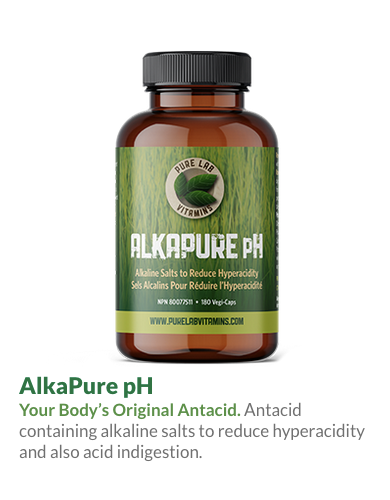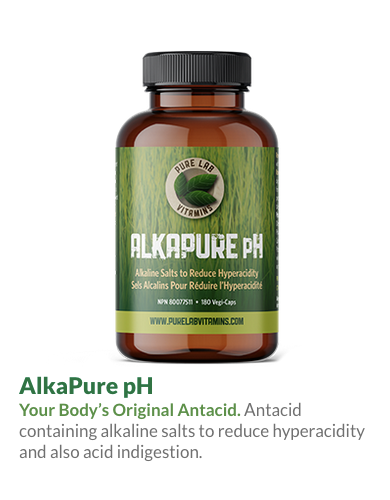Pure Lab Vitamins
ALKAPURE pH 180 Vegi-Caps
ALKAPURE pH 180 Vegi-Caps
Couldn't load pickup availability
"YOUR BODY'S ORIGINAL ANTACID"
About AlkaPure pH
A healthy body is in balance.
Mineral Balance, Hormonal Balance, Acid-Base Balance...
When talking about Acid-Base Balance (pH Balance) we have to distinguish between Gastric Acid and Systemic Acidity.
We need healthy amounts of acid in our stomach to break down proteins, fats and carbs, to absorb all minerals and to function as a natural barrier for bad bacteria, parasites, and fungi.
Stress, sedentary life style and our Standard American Diet (SAD) though, constantly increase levels of acidity via the blood into lymph, connective and other peripheral tissues – which we do not need.
Alkaline Therapy or pH Balance is not aiming to change blood pH, which the body maintains within its narrow pH window, but much rather help the body reduce latent, chronic metabolic acidosis in peripheral tissues.
The body compensates by sacrificing its alkaline reservoirs - minerals from bones and muscles - and the two buffering systems of the blood – Bicarbonate and Phosphate Dibasic.
Chronic Stress and SAD will slowly deplete these alkaline reservoirs, causing Osteoporosis, or, in the attempt to maintain blood pH levels the body is forced to deposit acids in the tissues, usually in the periphery, like hands and feet and skin, where hyperacidity will fuel inflammation.
AlkaPure pH, when taken between meals, rebalances gastric acid and replenishes the body's buffering systems. Bones and muscles no longer need to sacrifice their supplies.
Reflux, believed to be caused by too much stomach acid, and treated with acid blocking drugs,
can oftentimes be caused by the exact opposite: too little alkalinity.
Why else would the elderly, who have a low gastric acid production, have such trouble with reflux symptoms?
But the acidity issues do not end with just reflux.
Even a slightly acidic body has a higher tendency to create inflammation, usually in peripheral tissues, like:
Tendons: Plantar Fasciitis, Bursitis, Carpal Tunnel, Tennis Elbow,
Skin: Rosacea, Psoriasis, Dermatitis, Eczema, ...
Chronic acidity and inflammation are the starting points for chronic disease:
Reflux (GERD), Osteoporosis, Food Sensitivities, Allergies, Autoimmune Diseases, IBS, Colitis, Arteriosclerosis, Osteoarthritis, Vasculitis...
High systemic acidity inhibits our immune system and favors bacteria and viruses. This predisposes the body to re-occurring infections.
Chronic Sinusitis, Candidiasis, UTI's, Interstitial Cystitis, Cellulitis, Herpes. Even Lyme Disease?
Combat acidity - Alkaline your body!
Maintaining alkalinity is essential for a healthy life.
Ingredients
Medicinal Ingredients (per capsule):
Potassium (Potassium Bicarbonate, Potassium Phosphate Dibasic) 50mg
Sodium (Sodium Bicarbonate, Sodium Phosphate Dibasic) 62mg
Magnesium (Magnesium Carbonate) 36mg
Bicarbonate (Sodium Bicarbonate, Potassium Bicarbonate) 182.67mg
Phosphate (Sodium Phosphate Dibasic, Potassium Phosphate Dibasic) 73 mg
Non-Medicinal Ingredients:
100% vegi-caps, Cellulose, Magnesium Stearate (veg source), Silicon Dioxide.
Contains No:
Gluten, wheat, sugar, yeast, milk, egg, shellfish, soy, corn, or preservatives.
Research
"Acid Stress" happens when the sum of acidity and waste taken in and produced by the body, exceeds the body's buffering capacity and the capacity to excrete.
Beyond the generally accepted belief that an inflamed tissue has higher acidity - and that additional acidity increases inflammation - there is now evidence in a 2013 PubMed study that clearly outlines the connection between “acid stress” and an increased gene expression of pro-inflammatory cytokines.(5)
High systemic acidity fuels inflammation.
More and more research is pointing to 'lifestyle-induced, low-grade inflammation' for conditions like: respiratory diseases, mental disorders, and autoimmune diseases (1,2,3,4,6)
The main challenge is that our bodies have to decide whether to allow the waste to keep "floating around" (compromising a variety of important bodily functions) or deposit it somewhere that, for the short term, causes less harm.
The issue is, this deposition was only ever intended for a short period. But in our fast paced lifestyles with ever growing levels of stress, it does not get removed at all.
The result is, excess acidity slowly accumulating in the tissues, if the environmental and dietary stressors don't change.
Subsequently this will lead to tissues that are overloaded with acids and waste, which cause acid stress and triggers the release of pro-inflammatory cytokines - inflammation is the only tool the body has left in the attempt to deal with the excess waste.
This excerpt from a 2012 research article in the open access “Journal of Nutrition and Metabolism”, describes very clearly the changes we all see and feel in our daily lives:
“Modern man is exposed to an environment which has changed enormously since the time of the industrial revolution. In recent decades there has been a tremendous acceleration in innovations which have changed our lives completely. As a consequence, more than 75% of humans do not meet the minimum requirement of the estimated necessary daily physical activity [6], 72% of modern food types is new in human evolution [7], psycho-emotional stress has increased and man is exposed to an overwhelming amount of information on a daily basis.” (1)
We are faced with ever increasing levels of stress - and through that, acidity and inflammation. We see an ever decreasing quality of available food, with a decreasing level of contained nutrients, especially alkalining minerals, and an increasing level of gene modified content.
We are slowly coming to accept that relying on school medicine and the pharmaceutical industry can't fix these lifestyle problems. Only lifestyle changes and nutritional interventions can resolve the gap between our growing nutritional needs and decreasing nutritional content of our food. (Sad as that is.)
What can be done to stop or even reverse this process? We can change our ways - try to avoid stress as much as possible, find ways to deal with stress differently, chose foods that we know decrease acidity, exercise regularly, buy local, organic and unprocessed,... but first and foremost:
Alkaline your body ! Replenish your buffering capacities.
(1) Chronic inflammatory diseases are stimulated by current lifestyle: how diet, stress levels and medication prevent our body from recovering
Bosma-den Boer et al. Nutrition & Metabolism 2012, 9:32
http://www.nutritionandmetabolism.com/content/9/1/32
(2) The global diabetes epidemic as a consequence of lifestyle-induced low-grade inflammation.
Kolb H, Mandrup-Poulsen T. Diabetologia.2010 Jan;53(1):10-20. doi: 10.1007/s00125-009-1573-7. Epub 2009 Nov 5.
http://www.ncbi.nlm.nih.gov/pubmed/19890624?dopt=Abstract
(3) Obesity, metabolic syndrome, and type 2 diabetes: inflammatory basis of glucose
metabolic disorders.
Pradhan A. Harvard Medical School, Department of Medicine, Brigham and Women's Hospital, Boston, Massachusetts 02215, USA.
http://www.ncbi.nlm.nih.gov/pubmed/18240540
(4) Metabolic syndrome, inflammation and atherosclerosis.
Vasc Health Risk Manag. 2006;2(2):145-52. Paoletti R, Bolego C, Poli A, Cignarella A.
Department of Pharmacological Sciences, University of Milan, Italy.
http://www.ncbi.nlm.nih.gov/pubmed/17319458
(5) Acid stress increases gene expression of proinflammatory cytokines in Madin-Darby canine kidney cells.
Raj S, Scott DR, Nguyen T, Sachs G, Kraut JA. Am J Physiol Renal Physiol. 2013 Jan 1;304(1):F41-8. doi: 10.1152/ajprenal.00128.2012. Epub 2012 Oct 17.
Medical Services, Veterans Affairs Greater Los Angeles Healthcare System, Los Angeles, CA 90073, USA.
http://www.ncbi.nlm.nih.gov/pubmed/23077097
(6) Bicarbonate increases tumor pH and inhibits spontaneous metastases.
Cancer Res. 2009 Mar 15;69(6):2260-8.doi:10.1158/0008-5472.CAN-07-5575. Epub 2009 Mar 10.
Robey IF, Baggett BK, Kirkpatrick ND, Roe DJ, Dosescu J, Sloane BF, Hashim AI, Morse DL, Raghunand N, Gatenby RA, Gillies RJ.
Arizona Cancer Center, University of Arizona, Tucson, Arizona, USA.
http://www.ncbi.nlm.nih.gov/pubmed/19276390
Share


